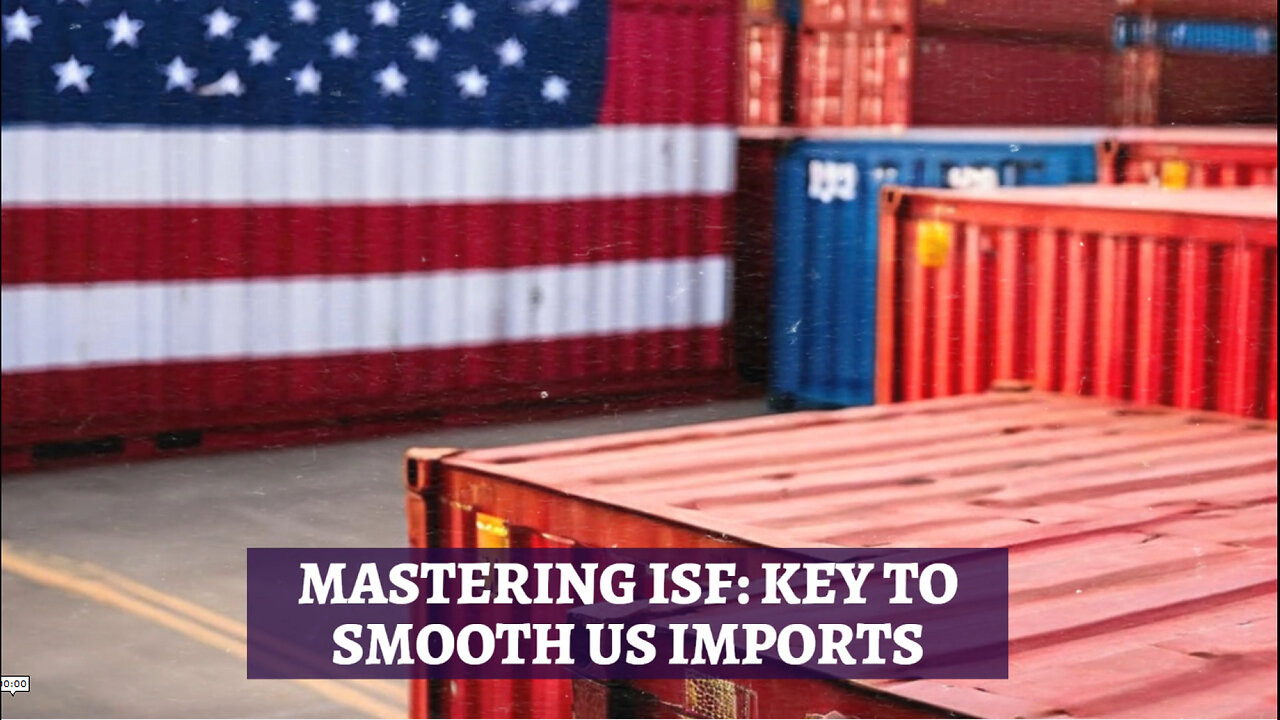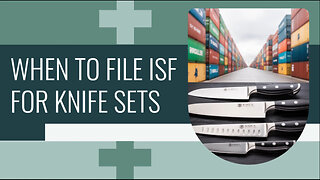Premium Only Content

Boost Trade Compliance with Importer Security Filing and Customs Bonds
License To Import // 323-578-6432 // file@licensetoimport.com // www.licensetoimport.com
In today's video, we discussed the vital role of Importer Security Filing (ISF) in ensuring trade compliance. ISF is a mandatory filing requirement enforced by US Customs and Border Protection (CBP) that involves providing specific information about the cargo before it arrives in the United States. The importance of ISF lies in its contribution to national security and the streamlining of the cargo clearance process. By requiring importers to submit data in advance, CBP gains a comprehensive understanding of incoming cargo, allowing them to assess potential security risks and enforce necessary safety measures. ISF also helps authorities identify high-risk shipments and focus resources on inspecting those that pose genuine security threats, while expediting the clearance process for low-risk shipments. Key details about ISF include the deadline for filing, which is at least 24 hours before the cargo is loaded onto a vessel bound for the US, and the requirement to file electronically. Importers often rely on customs brokers to accurately file the ISF and ensure compliance with other customs requirements. Customs bonds are also crucial in trade compliance, serving as a financial guarantee that importers will comply with customs regulations. They provide assurance that importers will pay customs duties, taxes, or penalties if they fail to meet their obligations. There are two main types of customs bonds: single-entry bonds for one-time imports, and continuous bonds for multiple entries within a defined period. Customs bonds facilitate the smooth release of cargo with minimal delays. In conclusion, ISF and customs bonds are integral components of international trade, ensuring security, compliance, and the seamless movement of goods across borders.
#usimportbond #isfcustomsbroker #uscustomsclearing #isfentry
Video Disclaimer Here: This video is solely for education and is not endorsed by any US government agency.
00:20 - Importer Security Filing (ISF) is a mandatory requirement by U.S. Customs and Border Protection (CBP) that involves providing specific cargo information before it arrives in the United States to enhance national security and streamline the clearance process.
01:11 - ISF helps customs authorities identify high-risk shipments, focus resources on inspecting potential security threats, and expedite the clearance process for low-risk shipments. This risk management approach enhances security and promotes the smooth flow of international trade.
01:34 - ISF must be filed at least 24 hours before cargo is loaded onto a vessel bound for the U.S., with specific information such as shipper's details, consignee's information, cargo description, and carrier data required. Importers are responsible for filing ISF, often with the assistance of customs brokers.
02:20 - Customs bonds are financial guarantees required by CBP to ensure importer compliance with customs regulations. Single-entry bonds are for one-time imports, while continuous bonds cover multiple entries within a defined period. Having a customs bond in place is crucial for smooth cargo release with minimal delays in international trade.
-
 1:39
1:39
License To Import
1 month agoWhen To File ISF For Knife Sets
9 -
 LIVE
LIVE
Film Threat
17 hours agoVERSUS: AUGUST BOX OFFICE BLOOD BATH! MARVEL IS COOKED! | Film Threat Versus
40 watching -
 LIVE
LIVE
Jamie Kennedy
18 hours agoThe Truth About Anger, Race, & Feminine Energy w/ Jesse Lee Peterson | Ep 219 HTBITY
47 watching -
![[Ep 734] Leftists Support of Black-on-Black Crime | Bolton Raid / Media Hypocrisy](https://1a-1791.com/video/fww1/0e/s8/1/a/F/p/c/aFpcz.0kob-small-Ep-734-Leftists-Support-of-.jpg) LIVE
LIVE
The Nunn Report - w/ Dan Nunn
57 minutes ago[Ep 734] Leftists Support of Black-on-Black Crime | Bolton Raid / Media Hypocrisy
129 watching -
 29:39
29:39
Afshin Rattansi's Going Underground
1 day agoEx-Israeli PM Ehud Olmert: INTOLERABLE Amount of Innocent Palestinians Have Been Killed in Gaza
1.73K24 -
 7:49
7:49
Dr. Nick Zyrowski
6 months agoVitamin D is Dangerous? Get The TRUTH!
3.08K11 -
 1:03:48
1:03:48
daniellesmithab
2 hours agoExploring Nuclear Energy in Alberta
7.57K3 -
 LIVE
LIVE
Reidboyy
1 hour ago $0.15 earnedNEW FREE FPS OUT ON CONSOLE NOW! (Delta Force = BF6 with Killstreaks)
58 watching -
 2:30:04
2:30:04
Nerdrotic
4 hours ago $1.67 earnedNerdrotic Nooner 509
18.7K1 -
 1:48:16
1:48:16
Tucker Carlson
3 hours agoCliffe Knechtle Answers Tough Questions About the Bible, Demons, Israel, Judas, Free Will, and Death
64.4K130